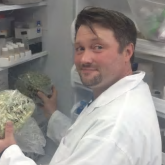Dr. Jason L. McCallum

Characterization of bioactive natural products from plants
- extraction, isolation, & purification of plant bioactives
- assay-guided fractionation of plant bioactives
- structural characterization via LC-MS, MS-MS
- hops, berries, small fruits, native plants
- plant protection
- human health
Current research and/or projects
Dr. McCallum's research program primarily focuses on improving the attributes of plants, for both food and non-food uses, in support of the horticulture and agri-food sectors.
Dr. McCallum characterizes phytochemical compounds in plants which may play a beneficial role in human health, or provide plants with improved performance against pests.
Research and/or project statements
- hops (Humulus lupulus L.) germplasm development
- bioactives discovery from berry and small fruit crops
- characterizing plant defensive compounds for improved plant performance
- characterizing signalling molecules involved in plant-microbe interactions
- characterizing phytochemical profile of native plants
Professional activities / interests
Student Mentorship/HQP training:
- on the job training (OJT) internships
- Co-operative Education student mentorship/supervision
- Honour’s student mentorship/supervision
- Graduate student mentorship/supervison
Education and awards
Education:
- Ph.D. Plant Science, University of Guelph, Ontario Agriculture College (OAC), Department of Plant Agriculture, 2008.
- B.Sc.(Hons. Co-Op) Biochemistry: Biotechnology Option, University of Waterloo, Faculty of Science, Department of Biology, 2003.
Awards:
- NSERC PGS-D fellowship (2005-08)
- NSERC PGS-M fellowship (2004-05)
- OGS fellowship (2003-04)
Key publications
-
An update on our efforts towards commercialization of AAFC wild hops was presented. The top four accessions (working names 'Aroostook', 'Apohaqui', "Tantramar', and 'Digdeguash') were introduced to a crowd of growers and brewers.
2023 - View publication details
-
Foster, A., Johnstone, E., McCallum, J., & Mills, A. (2023, November 8). Hops and malt barley disease update: Current and emerging threats. First Annual PEI Malt Barley and Hops Day, Charlottetown, PE, Canada.
2023 - View publication details
-
Antioxidant Boosts Immunity Against Late Blight in Potatoes Weekly Scoence Stories,
2023 - View publication details
-
Crop Breed Genet Genom. 2020;2(4):e200017. https://doi.org/10.20900/cbgg20200017
2020 - View publication details
-
McCallum, J.L., Vacon, J.N.D., Kirby, C.W. (2020). Ultra-Micro-Scale-Fractionation (UMSF) as a powerful tool for bioactive molecules discovery. Molecules, [online] 25(16), http://dx.doi.org/10.3390/molecules25163677
2020 - View publication details
-
https://www.thestar.com/news/canada/2020/02/23/research-seeks-to-tap-into-craft-brewing-potential-of-maritime-wild-hops.html
2020 - View publication details
-
2020. McCallum, J.L., Mills, A.A.S. Research seeks to tap into the craft-brewing potential of Maritime wild hops. The Star. February 23, 2020. Retrievable at: https://www.thestar.com/news/canada/2020/02/23/research-seeks-to-tap-into-craft-brewing-potential-of-maritime-wild-hops.html
2020 - View publication details
-
https://www.theglobeandmail.com/canada/article-research-seeks-to-tap-into-craft-brewing-potential-of-maritime-wild-2/
2020 - View publication details
-
https://globalnews.ca/news/6585372/maritime-wild-hops/
2020 - View publication details
-
Cultivated potato (Solanum tuberosum L.) is the third most consumed food crop after rice and wheat. Potato is an auto tetraploid crop species having a highly heterozygous genetic base and a complex genome making its genetic studies tedious. Recently, diploid potato breeding has regained interest in the potato genetics community. Genetically, diploid potatoes are easy to work with and can be used in the cultivated potato breeding process as genetic resources and also they can be grown on their own as varieties. However, diploid breeding continuum faces many challenges including anti-nutritional factors and self-incompatibilities. Whereas conventional breeding strategies contributed to the releasing of varieties with low SGA, substantial resources are still required to minimizing these anti-nutritional factors. Recently, we developed and characterized an ethyl methane sulfonate mutagenized pre-breeding diploid potato population for identifying lines with low anti-nutritional factors. The data will be presented and discussed in relation to the high potential for diploid potatoes as a complement to tetraploid potatoes and in pre-and post-harvest management contexts.
2019 - View publication details
-
Das, Q., Lepp, D., Yin, X., Ross, K., McCallum, J.L., Warriner, K., Marcone, M.F., Diarra, M.S. (2019). Transcriptional profiling of Salmonella enterica serovar Enteritidis exposed to ethanolic extract of organic cranberry pomace. PLoS ONE, [online] 14(7), http://dx.doi.org/10.1371/journal.pone.0219163
2019 - View publication details
-
https://pag.confex.com/pag/xxvii/meetingapp.cgi/Session/5691
2019 - View publication details
-
https://www.eventscribe.com/2018/ASPB/searchbyposterbucket.asp?pfp=PosterBucket
2018 - View publication details
-
Potatoes: From seed to seed – can we change the approach?
2018 - View publication details
-
https://pag.confex.com/pag/xxvi/meetingapp.cgi/Paper/30386
2018 - View publication details
-
Fofana, B., Ghose, K., Somalraju, A., McCallum, J., Main, D., Deyholos, M.K., Rowland, G.G., Cloutier, S. (2017). Induced mutagenesis in UGT74S1 gene leads to stable new flax lines with altered secoisolariciresinol diglucoside (SDG) profiles. Frontiers in Plant Science, [online] 8 http://dx.doi.org/10.3389/fpls.2017.01638
2017 - View publication details
-
Nabuurs, M.H., McCallum, J.L., Brown, D.C.W., and Kirby, C.W. (2015). "NMR characterization of novel pyranoanthocyanins derived from the pulp of Panax quinquefolius L. (North American ginseng).", Magnetic Resonance in Chemistry. doi : 10.1002/mrc.4366
2017 - View publication details
-
Fofana, B., Ghose, K., McCallum, J., You, F.M., Cloutier, S. (2017). UGT74S1 is the key player in controlling secoisolariciresinol diglucoside (SDG) formation in flax. BMC Plant Biology, [online] 17(1), http://dx.doi.org/10.1186/s12870-017-0982-x
2017 - View publication details
-
Cloutier S, Ghose K, Somalraju A, McCallum J, Fofana B (2017) Further evidence that mutations in UGT74S1 alter SDG lignan glucoside profiles in EMS flax mutant lines. Proc 25th Plant and Animal Genome meeting, San Diego, CA, 14-18 Jan, P232
2017 - View publication details
-
Fofana, B., Ghose, K., McCallum, J.L., Somalraju, A., Cloutier, S., Deyholos, M.K., and Rowland, G.G. (2016). "Developing EMS flax mutant lines with altered SDG lignan glucosides.", PAGXXIV 2016, San Diego, USA, January 9-13, 2016.
2016 - View publication details
- 1 of 5
- next ›
Contact
Research facility
Expertise
Affiliations
- Adjunct faculty: Department of Biology, University of Prince Edward Island (UPEI)
- Adjunct faculty: Department of Graduate Studies, University of Prince Edward Island (UPEI)
- Advisory Board: Holland College, BioScience Technology Program
- Editorial Board: Food Research International
- Past member: Phytochemical Society of North America